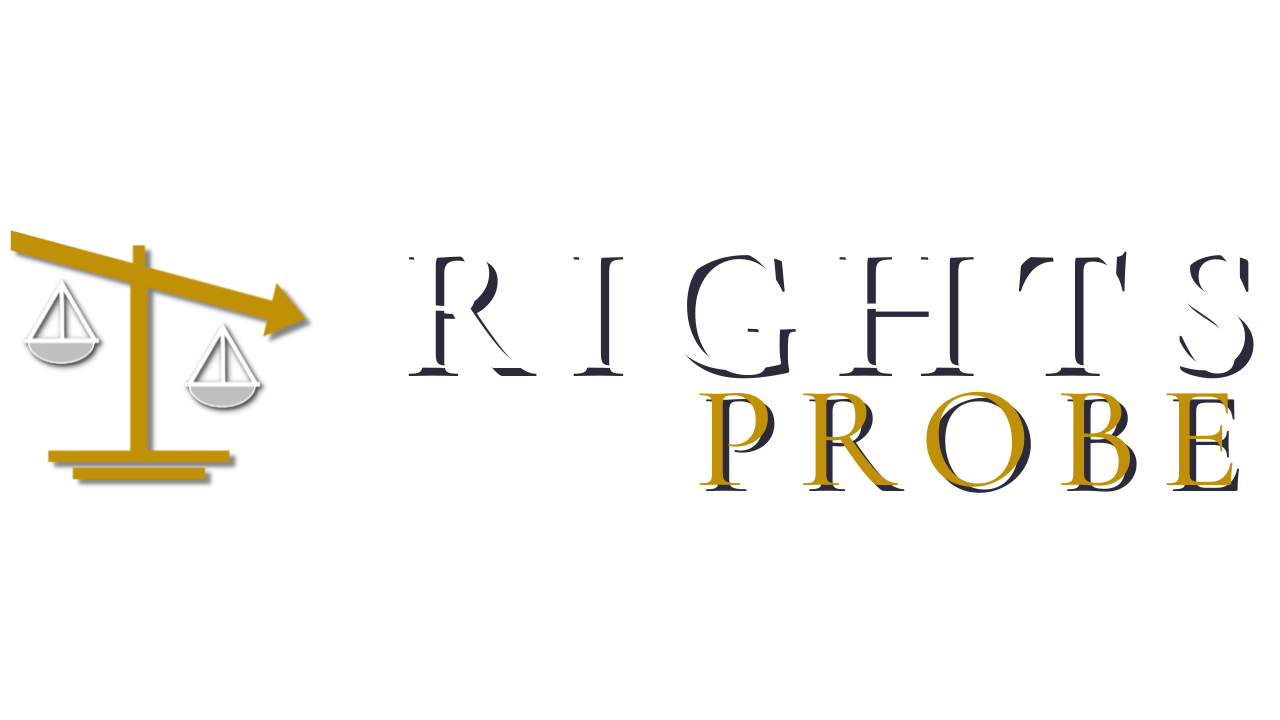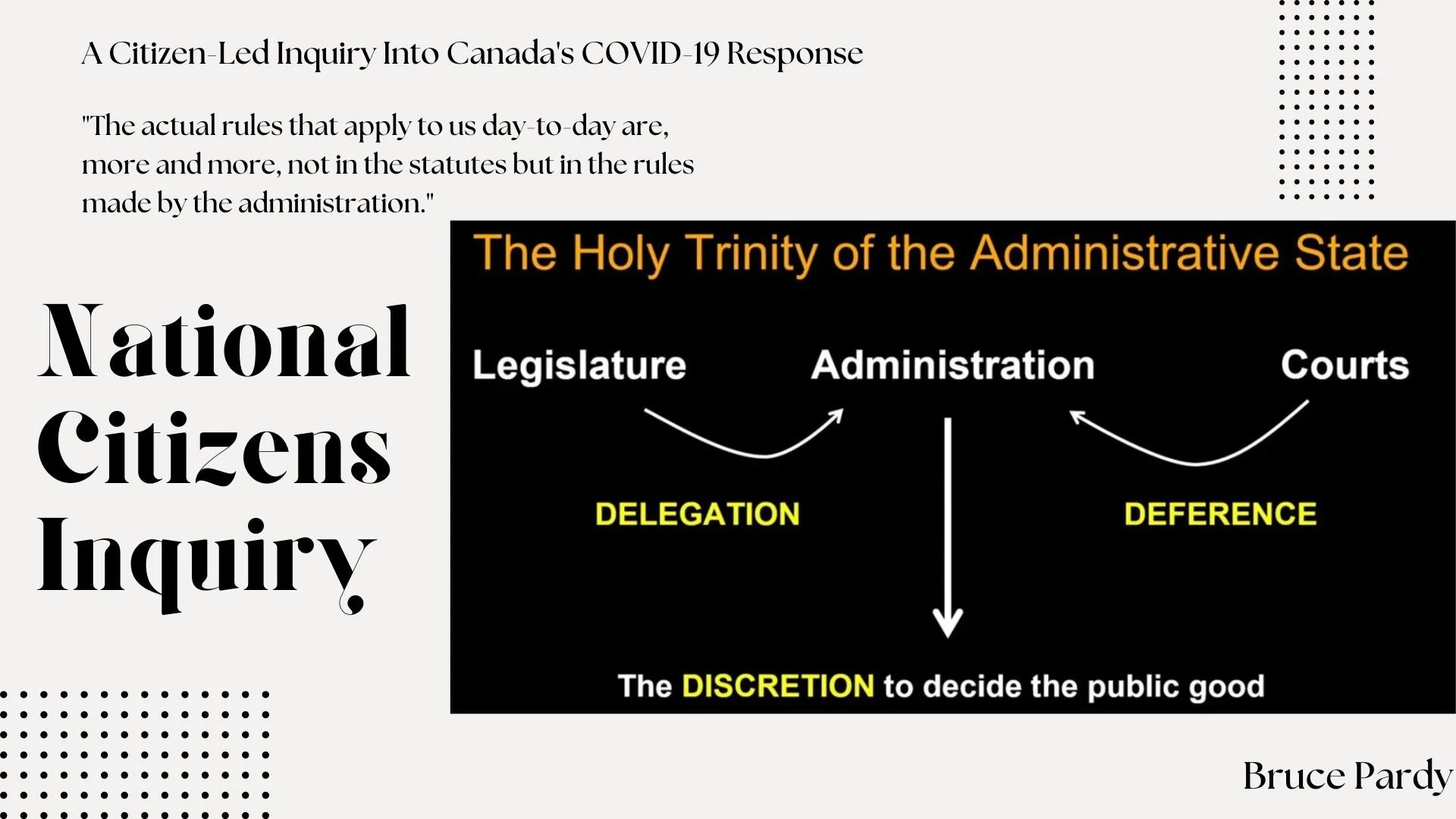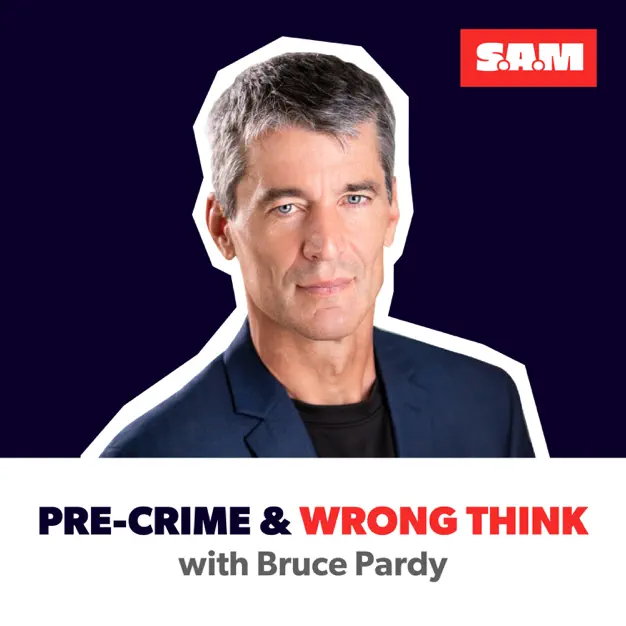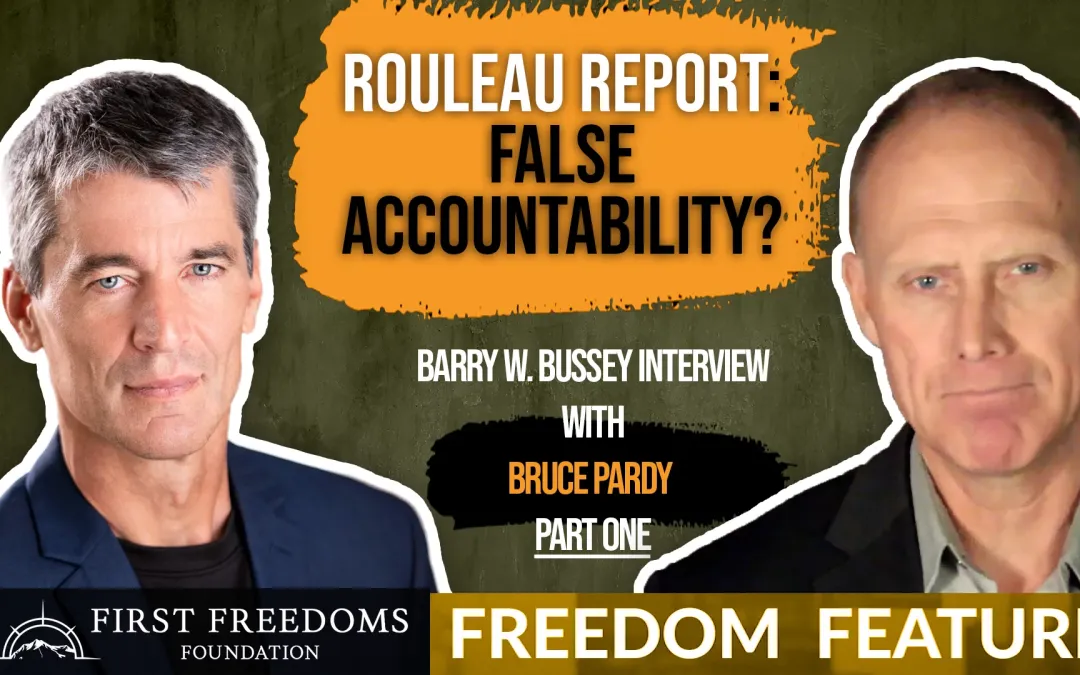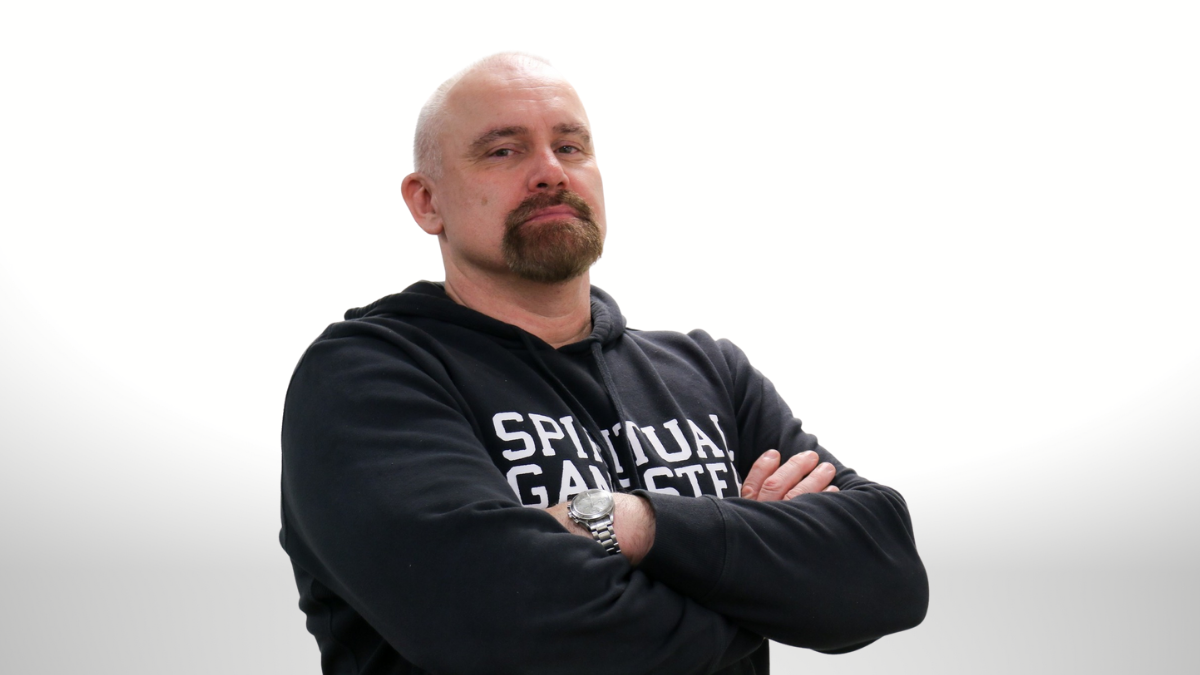WATCH & LISTEN - ARCHIVES
Professor Bruce Pardy is one of a number of witnesses who have stepped up to testify at a citizen-led inquiry into Canada's COVID-19 response. The purpose of the citizen-funded initiative is to investigate independently what went right and what went wrong with the responses and actions to COVID-19 taken by our governments across Canada, and to look at how national crises might be better managed in future. [Learn more about the National Citizens’ Inquiry here].
Professor Pardy’s testimony touched on concerns he has raised throughout the pandemic and continues to voice, including the emergence of Canada's administrative state. He addressed the notion of the public good and how many of us have bought into the premise that governments should manage society and that our officials should fix social problems. But, says Professor Pardy, "We shouldn't have officials deciding the public good." When that authority is the role of the state, there's no way to avoid a repeat of the government interventions we saw during the pandemic - and their impacts on the fundamental freedoms of Canadians - unless this premise is challenged.
Over time, and well before COVID-19, legislatures "instead of passing statutes that contain the rules are, more and more, passing statutes that delegate rule-making authority to the administration.... Now the executive branch is doing the work of the legislature," says Professor Pardy. What happened to the rights and freedoms contained in the Charter? What happened to our perception of how we thought our system worked? What happened to the notion of a "solid and written law" that we thought we could depend on? The professor’s testimony covered these topics, which he has sounded the alarm on right from the get-go:
Western liberal democracies, especially Canada, have descended into authoritarianism. COVID appears to be the reason, but this transformation has long been underway. The virus simply unleashed the gathering storm. Over time, managerial states have steadily expanded their reach into every aspect of modern life. Governments supervise behaviour and speech, mainstream media propagandize, public schools and universities indoctrinate, and professional regulators require ideological comportment. The chattering classes now demonize the ideas upon which their own civilization is based, including the sovereignty of the individual over the group, freedom of speech, and equality of treatment under the law. While we once celebrated liberties and achievements, people are now fearful, ashamed, dependent, and obedient.
The law will not protect us. The law is a product of culture, and when the culture turns, the law goes with it. ~ [Excerpt from "The first obstacle is our confidence that things won’t get worse"]
The one silver lining according to Professor Pardy: "If we don't like what we see, we gotta fix it."
Go directly to the video recording of Bruce Pardy’s testimony here
Professionals are being supervised in their political attitudes by their regulators and nowhere is this more apparent than at the Law Society of Ontario. As such, the stakes could not be higher for the LSO's “bencher” (governor) elections now under way.
Professor Bruce Pardy joins host Barry W. Bussey to look at exactly what's at stake for election candidates and the more than 55,000 lawyers the Society represents. On one side, we have the FullStop group of candidates (whose mandate is to Stop Bloat • Stop Creep • Stop Woke) and the Good Governance Coalition (establishment activists who wish to continue the ideological agenda of the pre-2019 program that caused the FullStoppers to come into existence).
At the heart of this struggle is a "Statement of Principles" that if imposed would require lawyers to promote equality, diversity and inclusion in their professional and personal lives. Why would these seemingly desirable objectives be a threat to the practice of lawyers and their capacity to serve their clients? Listen in to learn more.
Watch Here
Promoting Inclusion Through Exclusion
Professor Bruce Pardy and Barry W. Bussey continue the conversation on the LSO's “bencher” elections.
Once upon a time, bencher elections did not draw much attention from members but all that changed, recounts Professor Pardy, when it seemed an established interest within the Law Society of Ontario was intent on “coming after us with a political agenda that required us to embrace a politics we did not agree with in order for the right to carry on with our licenses.” This prompted a small group of lawyers, who would never have thought to run for bencher, to run on the platform of getting rid of it. They succeeded in halting implementation of an ideological agenda but the agenda did not go away. “A tyranny of an established interest entrenched inside the law society is doing its damnedest to make sure it stays there,” says Professor Pardy. The test of the upcoming election is to find out whether that agenda is “actually the view of the majority or if there’s a lot of lawyers out there who don’t agree with this.”
Watch Here
Professor Bruce Pardy and host Barry W. Bussey rake over the final word from the Emergencies Act inquiry—the Rouleau report.
Professor Pardy concludes that the inquiry served as a “cleansing process” for the justification of implementing the Emergencies Act: a process that produced a “performance” if not an outcome. The conversation continues from part one through to part two on what the inquiry’s court-like performance means for cases that are ongoing and our expectations around this process. Interestingly, Professor Pardy submits the problem is not the government: “It’s your fellow Canadians who think that everything that happened [here] is fine.” Barry Bussey concurs that “we all need to recognize our role in the political process,” and that if we “reward those who lie, we are reflecting ourselves in our politicians.”
Part One | Part Two
Capitalism is defined by freedom. Corporatism - the economic force now dominating the United States - is a genuine source of oppression. In this video, Professor Bruce Pardy and content creator, Kate Wand, explore the growing partnership between America’s technocratic governments and powerful corporate elites. The resulting corporatist system prevents open competition and enables governments to favour, protect, subsidize, and benefit the business interests they are acting in concert with.
Are Canada's courts committed to upholding the Constitutional rights and freedoms of individual Canadians, or, has the focus shifted to group rights?
What is the managerial state, and how is it operating in Canada?
Do the courts, and society in general, treat movements on the "left" with the same standards as those on the "right"?
Why does any of this matter? Lawyer and law professor Bruce Pardy explains.
The Andrew Lawton Show: Professor Bruce Pardy has maintained from the outset there was no legal basis for the invocation of the Emergencies Act. The point of the Commission’s inquiry, he says, is to perform a “ritual” with court-like trappings. Nevertheless, the process did confirm the evidence wasn’t there to support the belief the invocation of the Emergencies Act was justified. Listen in to Professor Pardy’s segment of the show at the 51.36 mark.
That Felt Like an Inside Job: Professor Bruce Pardy joins The Ezra Levant Show to dig into the results of the Emergencies Act Inquiry in Ottawa. “It is a mistake to think that this was going to be a court-like process,” says Professor Pardy. “The inquiry was simply putting together a report, not a binding report, and it can’t find liability.”
Canada’s Legal Revolution and Its Dangers
Law professor Bruce Pardy joins Liberty Coalition Canada to explore the "quiet and unopposed" revolution that has transformed Canadian society, with a focus on the Josh Alexander case, where a student at St. Joseph's Catholic High School in Renfrew was suspended as well as banned for a month because he questioned the non-binary use of bathrooms at his school. On the surface, what may seem like a dispute over bathroom use and trans rights is more fundamentally a dispute about the expression of ideas in speech, says Professor Pardy.
What is freedom? "Freedom is supposed to be universal and reciprocal," says Professor Pardy. "You are allowed to call yourself whatever you want. You're allowed to dress however you want. You're a free person. That's what being in a free society means. But everybody else is free, too. If they don't want to call you what you want them to, they have the freedom to do that. We've lost that idea. Freedom only travels, apparently, in one direction." The test for free speech, he says, “is not truth but what you think.”
From a legal perspective in Canada, formal equality has been rejected in favour of substantive equality. If the focus is on equality of outcome, that means different rules for different people to achieve a same result. But, says Professor Pardy, everyone is infinitely different, and the equality of the rule of law (or "blind justice") means different outcomes according to those infinite differences. To achieve equality of outcome, the state inevitably steps in to manage, regulate and dictate in areas of our lives it has no business to - an outcome that is the very opposite of freedom and free society. Listen via the link below for the full discussion and for recommendations on how to advocate for the return of open debate and the free flow of opinions and ideas.
Listen in here 🎧
The Path We’re Going Down Is Intolerable and Untenable: An Interview With Bruce Pardy
Professor Bruce Pardy joins The Ezra Levant Show to discuss the state of everything from law and politics to freedom, journalism, activism, as well as the ongoing impact of the Covid scare on civil liberties and our collective psyche. Bruce, a law professor - or “professor of freedom” as Ezra has dubbed him - describes how “the Covid debacle pulled back the curtain” on the way our institutions, government departments, courts, legal and medical professions work. People were “shocked and appalled,” says Bruce, to discover that the world they thought they knew did not really exist and that the apparatus of society did not work the way they believed it did. A fundamental belief in these systems of governance and organization has been profoundly damaged as a result of the Covid rupture, he says. Or, as Ezra put it, a large group of people in Canada saw that all of the checks and balances had failed simultaneously: “opposition parties did not oppose, conservatives were not conservative … the media went from skeptics to propagandists … doctors were either silent or silenced … the police became enforcers of goofy mask rules …” etc.
Bruce cautions that although Covid pulled back the curtain, the trends in force today have been deepening for decades as a result of an ideological agenda that took root in the nation’s universities and graduated into society and its institutions through the school of thought now in control: the woke worldview. The old joke that university politics are vicious precisely because so little is at stake has proved false over time, says Bruce.
The positive in a sea of negative? Freedom Convoy 2022 proved that “the nobodies” in trucks and “the nobodies” with camera phones can indeed speak truth to power and that, to quote George Orwell’s 1984: “If there is hope, it lies in the proles.”
Listen in here 🎧
Breaking Free from Political Polarization
Join law professor Bruce Pardy (executive director of Rights Probe) and Kate Wand (content creator and host of AIER's Liberty Curious) as they dive into political tribalism and the differences and similarities between the various schools of thought. Their focus lands on that eternal “monkey in the middle”—classical liberalism—a political tradition that, at least in recent times, tends to team-up with the “losing side”. Through the lens of classical liberalism, how might we view the world differently and approach problems and choices in a more hands-off style that respects individualism? How would this work in reality? Can it work? Why is it a tough sell compared to a binary worldview? Interesting threads of conversation are given further pause, such as the concept of “free will”. Is there such a thing or does it exist for one camp and not another? Watch in full or drop in according to interest:
0:00 - Introduction 2:08 - Champions of free speech 3:38 - The “horseshoe” political spectrum 8:16 - Classical liberal values 11:35 - Fusionism 16:05 - Different takes 20:00 - The nanny state 23:00 - Universal values 25:10 - The righteous mind 29:18 - Consequentialism 33:08 - Managerial state 36:50 - Markets 38:02 - Founding principles 41:20 - Is everything broken? 44:45 - Universities feed the administrative state 46:44 - The collectivists 49:25 - Political ubiquity 52:54 - Critical mass 54:52 - Collectivist ideologies 58:20 - Historical cycles 1:00:42 - Classical liberalism led us here? 1:06:51 - Free markets parallel with human society 1:08:35 - Last thoughts.
Sugarcoating the Emergencies Act
Unpacking the year that was and the state of freedom in Canada with host Barry W. Bussey, law professor Bruce Pardy and professor Iain Benson. Freedom Convoy 2022 takes the spotlight with Professor Pardy noting that here was the first time in Canada, in a long time, where “everybody saw” a group of people articulate “opposition to an agenda that the elites were pushing.” Was it a threat? Well, it did constitute a threat to the chattering classes. It also meant “a lot of people suddenly understood they were not alone in [their] thinking about vaccine mandates and Covid rules.” Will the ‘22 “burst of light in the darkness” fade or will it stand as an inflection point? [A First Freedoms Foundation video feature]
Watch the video here
What Are Rights? Curious about human rights? Want to learn more about the Canadian Charter of Rights and Freedoms? Tune in here for a discussion on rights contained in the Charter and how they have affected our lives. This video is the Socratic discussion in its entirety led by Bruce Pardy, professor of Law and Executive Director of Rights Probe. Presented by The Ideas Institute "Soapbox" on October 23, with a special introduction by Trish Wood. For a video teaser of this talk see here.
Leaders on the Frontier: The State of Law in Canada
Individual autonomy – the crowning achievement of Western legal systems – is now at risk. The law is moving from individualist to collectivist; from blind justice to social justice; from equality of treatment to equality of outcome; from capitalist to statist; from economic competition to political conformity; and from neutral adjudication to judicial activism. The managerial state has become ubiquitous. Join Professor Bruce Pardy as he discusses the state of law in Canada. For more on this, see here.
Human Rights and the Law
Professor Bruce Pardy of Rights Probe has long argued that Canada is threatened by an expansive managerial state and a legal system distorted by progressive ideology. He warned of dire consequences as soon as COVID lockdowns were imposed in the spring of 2020, and is one of the authors of the Free North Declaration, a call to arms to protect civil liberties from COVID irrationality and overreach. Professor Pardy joins The Canadian Story podcast to discuss “pandemic amnesty”.
Listen in here 🎧
The Rule of Law and the Current Challenges to Democracy
Human rights advocate, Aga Wilson, talks to Rights Probe executive director, Bruce Pardy, about the current challenges to democracy and how the legal system in many cases has been used to benefit the current global Covid-19 narrative, as well as Professor Pardy’s views on natural law and common law.
Watch the video here
Episode Seven of Free Expression: The Future of A Fundamental Freedom. In this episode, host Dax D’Orazio speaks with special guest, Bruce Pardy, executive director of Rights Probe and Professor of Law at Queen’s University. They discuss the nature and importance of freedom in a democratic society, the legitimacy of legal restrictions on expression, and the relationship between free expression and equality.
Listen in here 🎧
Should the Government Be Allowed to Do This Kind of Thing?
What happened to society's broad agreement about government overreach, the legal definition of certain words and a political landscape that once included a middle ground? In this podcast episode of “Grey Matter,” constitutional lawyer Leighton Grey and law professor Bruce Pardy of Rights Probe discuss the obvious divide in our political system and how villainizing each other isn’t a productive exercise, some of Pardy’s thoughts on the Emergencies Act Inquiry, and why it’s important for the inquiry to reach a decision on truth and justice blindly. Pardy and Grey explore the idea of the Alberta Sovereignty Act and how it affects the rest of Canada, how Bruce feels as a classical liberal about the irrational reaction to the Covid-19 pandemic, and what we can be doing to correct the errors the current government has made in its handling of the situation.
Listen in here 🎧
This episode’s recommended reading:
Intellectuals and Society — Thomas Sowell
The Law — Frederic Bastiat
The Road to Serfdom — F. A. Hayek
New Discourses
